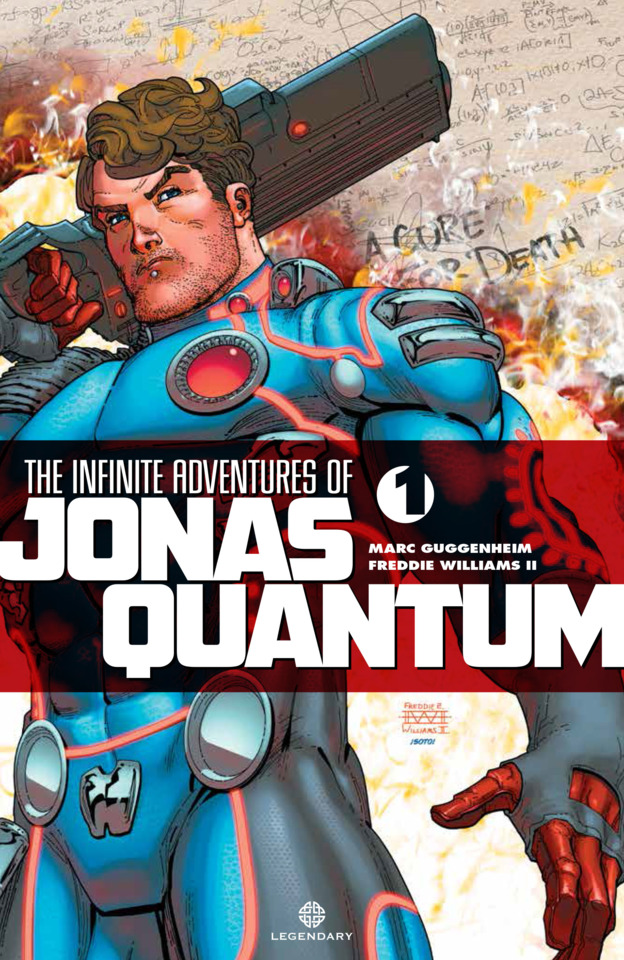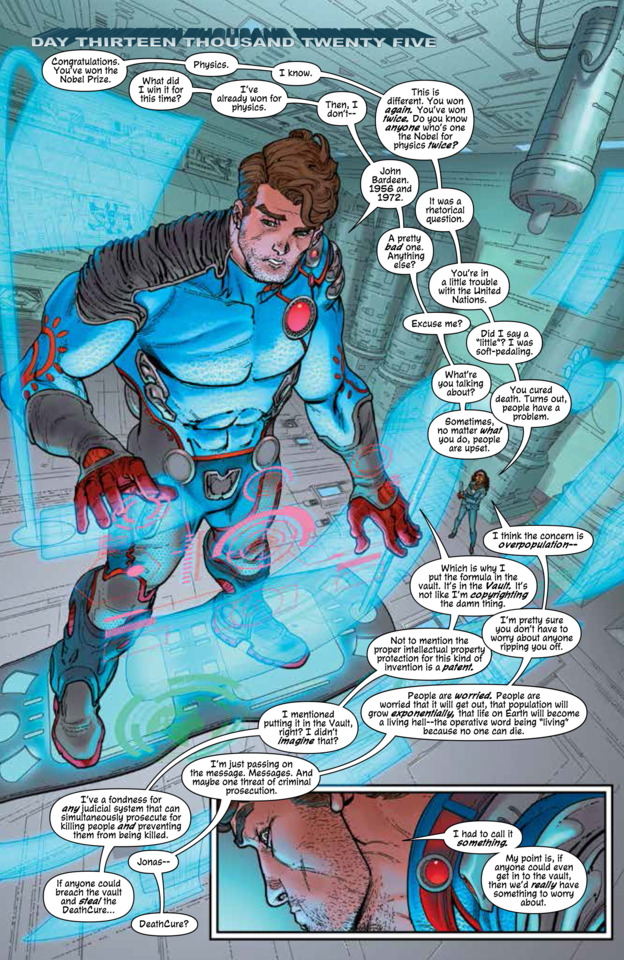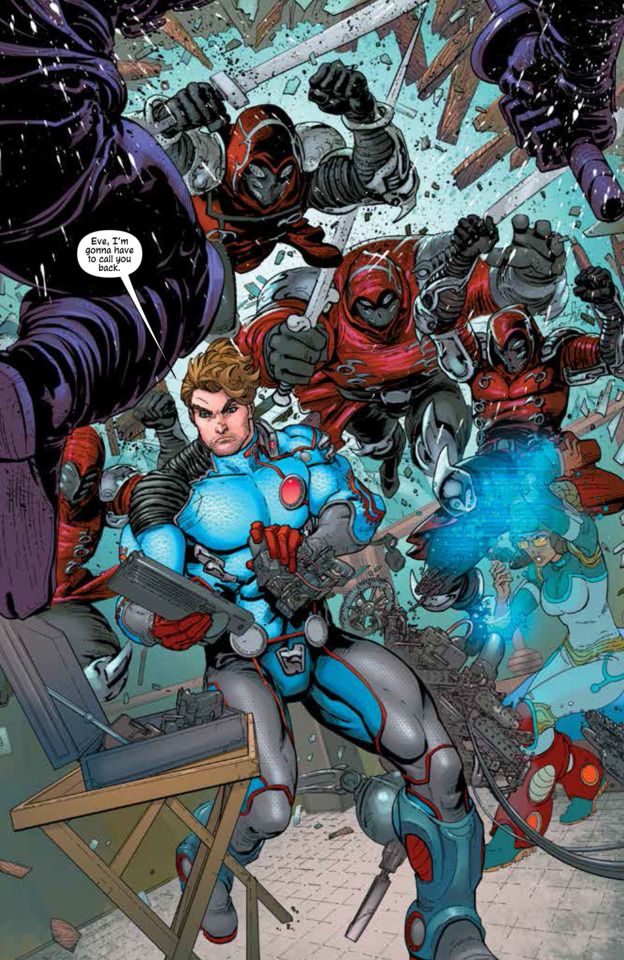Writer Marc Guggenheim and artist Freddie Williams are coming together for a new creator-owned series that delves into the mind of a hyper-intelligent character and his adventures. THE INFINITE ADVENTURE OF JONAS QUANTUM recently came out through Legendary comics and Guggenheim talked to us over the phone about this new series.

COMIC VINE: What is THE INFINITE ADVENTURES OF JONAS QUANTUM all about?
MARC GUGGENHEIM: It's really inspired by all the comics I grew up with, the Stan Lee/Jack Kirby FANTASTIC FOUR, the DC Silver Age, science fiction comics and Doctor Who. It's a little bit of madness. I kind of initiated with this notion I had that Indiana Jones was created as response to James Bond but no one created a character that was a response to Indiana Jones. This was many years ago, about 15 years ago, when I started playing with the character.
Over time, the character, Jonas, started to take form and I started to gravitate towards the notion whose super power is his intelligence. The more I thought about it, the elements started to come together, but that was sort of the luxury of having an idea to play around with, but with 15 years before I started to write.
CV: Jonas' power is called "infinite intelligence," which is an unfamiliar term. Can you explain exactly what "infinite intelligence" actually is?
GUGGENHEIM: One of the fun things about comics is that there is a whole mess of terms that people have heard before or heard in a while. His intelligence has some limitations, obviously. The fun of this character is that his only limitation is himself.
CV: As we've seen with characters like Reed Richards, most super-intelligent characters end up being narcissistic or have delusions of grandeur. Is this something you'll explore with Jonas?
GUGGENHEIM: I think he flirts with it. I think that it's one of the things he struggles with. One of the things I'm exploring in the series first is not so much that he's a narcissist but that it's the fact he's lonely. When you possess that kind of intelligence, it's distancing. Reed Richards really lucked out that he could get Sue Storm. I'm playing that Jonas is smarter than Reed and even less capable of grounding himself. All Sue has to put up with is Reed's work but we can imagine that they'll sit down, occasionally, and have dinner and actually have a conversation and Reed is able to come down to the level of a normal person and talk about stuff that's not quantum field theory. Jonas isn't able to do that. That's his kryptonite. It's his tragic flaw that he can't connect with other people.

CV: So in a sense, a big part of this story is going to be dealing with his own isolation?
GUGGENHEIM: Yeah. One of the things about the book is that it's constructed to be a self-contained adventure. While it's all self-contained, there are character elements that will peel back, like layers. The core of the book is this character. It's a character drama but there's not soap opera elements, the way they are on say Arrow. It's much more about this guy and through his adventures, we get different aspects of the character.
CV: So is the format is a bit more Doctor Who or Silver Age in nature, where week by week, we're getting a different story with this character?
GUGGENHEIM: Yeah, exactly. It's really a lot like Doctor Who and Silver Age comics. Back in the day, everything was self-contained stories and what was fun about them was you pick at any given issue and you'd get a story with a beginning, middle, and end, but you had no idea what that story was going to be and it was always this fun, unexpected thing. That's something I try to bring to the book, that notion that crazy ideas are going to be explored in each issue and sometimes, they'll be one-offs. I'm in awe of how Warren Ellis or Grant Morrison will "waste" an idea that warrants a feature film franchise in one panel. I'm not that kind of writer. I'm not that smart.
CV: Because this book deals with hyper-intelligence, wormholes, etc. How much research do you have to do within the realm of science for this book?
GUGGENHEIM: That's a great question. It's funny. I'm not doing a lot of active research. I'm not sitting around saying "I want to do an issue with wormholes, so I gotta research wormholes." I'm always reading and one of the things I'm interested in is science. When I write, I'm more approaching it from "what's in my notebook? What's something I read recently?" I'm using that to inspire the story rather than coming up with story first.
CV: So you're keeping it a bit more grounded even though it's completely out-there the first you see it.
GUGGENHEIM: Exactly. One of the things that is fun about the book is this unstated language that I'm trying to get across to the reader. It's almost like medical drama and there's all these weird medical terms, but if you understand the characters, then you can still follow it. That's the way I'm creating science here. Jonas is always going to have to talk above the reader but I'm trusting that the reader can still follow even though they can't understand everything he's talking about.
CV: What are some weird or out there inventions that Jonas has come up with in this book.

GUGGENHEIM: I love the fact that he's figured out how to shrink himself. This obviously isn't an invention that's not new to comics but the way he deploys the invention is new and fun. It's not just the intelligence of what he invents. They're new and different ways he decides to use it. There's also a gag, which in the book is called telepresence, you're in a room with talking to someone, but it's eventually revealed they're not there. One of the fun things of the book, every time we use a new invention, we still call it out with a little notation.
CV: Much like in the Silver Age.
GUGGENHEIM: Exactly. Again, it's trying to use the Silver Age as an inspiration much the same way they used the 1930s serials as an inspiration for Indiana Jones. We're not just aping it. We're reinventing it a little bit.
CV: How did Freddie Williams get involved in the series?
GUGGENHEIM: That's a great question. Freddie and I worked on JUSTICE SOCIETY for DC a number of years ago. We really wanted to work more together and we kept in touch and kept talking about doing something creator-owned together. It sort of just fit with the time, when I was talking to Legendary about this book. I had thrown out the book to him. All the pieces sort of fit together. Fred is the perfect person for this book. He throws out all these crazy ideas and images and he really embraces it. One of the nice things about the book and working with Legendary is that we're not limited to the standard 20 or 22 pages for the book. It's a much more open structure than when I have a page limitation. The panels per page ratio is much more generous than other books and that gives Freddie room to create these insane images. Again, we're inspired by the crazy Jack Kirby tableaus and he's not being Kirby by any stretch. We're taking inspiration from that wide-scope feel that Jack brings to things and putting that through the lens of Freddie's talent.
Thanks to Marc Guggenheim for chatting with us and JONAS QUANTUM is available now.